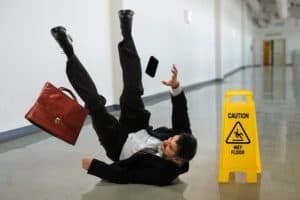
If you have slipped and fallen on a commercial property, you may be entitled to compensation for your injuries. These are so-called “slip and fall” claims, which are based on a theory of premises liability. Businesses have a duty to keep their premises safe for customers and others that are invited onto the property. This means businesses must take care to remedy hazards that could cause patrons or others harm. Typical hazards include spilled drinks or food, knocked over merchandise, damaged handrails or flooring, or unsafe conditions in a parking lot or sidewalk adjacent to the business.
To Prove a Slip and Fall Claim:
- there was an unreasonably dangerous condition on the premises;
- the business knew or should have known of the condition; and
- the business failed to take reasonable steps to remedy the condition or warn customers of the danger.
An Unreasonable Danger
Whether something posed an unreasonable danger is a question of fact for the court to decide, but basically anything that causes the ground to be slippery or uneven could satisfy this element. Damaged railings, stairs, or other conditions that could catch someone off-guard and cause them to fall could also be considered unreasonably dangerous.
The Business Knew or Should Have Known of the Condition
If a business knows of an unreasonably dangerous condition, it must work to remedy it. But, even if a business isn’t actually aware of the danger, they can still be liable for their failure to remedy if they should have known about it. This is called “constructive knowledge.”
If a hazard had existed for a substantial time or if the business should have known of the hazard through a reasonable routine inspection, constructive knowledge can be shown. Any other reason the business had to know that the hazard probably existed can also be relevant.
The Business Failed to Take Reasonable Steps to Remedy the Condition or Warn Customers
Whether a business has taken reasonable steps depends on the nature of the hazard. For some hazards, warning customers may be sufficient—but this isn’t always the case. For instance, a “caution slippery floor” sign isn’t adequate if the floor is slicker than an ice skating rink and the business is still inviting you to walk on it.
If you have been injured in a slip and fall accident, it is important to have an experienced premises liability lawyer investigate your case. At Branch & Dhillon, P.C., we regularly help slip and fall victims in Texas get the compensation they deserve for their slip and fall injuries. If you would like more information or would like to schedule a free consultation, please call us at (817) 533-3430.
